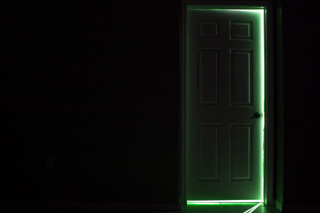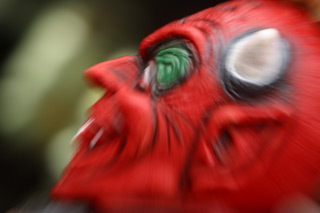|
|
|
|
WHY WE
LOVE TO BE SCARED ON HALLOWEEN |
|
Lets face it,
a large percentage of people really enjoy being frightened,
but why? To understand why, we must first realize that there is both a physical
and mental component to fear and Halloween, with its
frightening images and sounds, provides a perfect environment
for stimulating these.
While the physiology and psychology of fear work
hand-in-hand, we will try to describe them separately, to
better understand the entire process of fright. Knowing your
personal fear comfort level is important for controlling and
actually enjoying any frightful experience.
Be sure to read
our article for
surviving a haunted attraction.
The
Psychology of Fear
 Many
believe that people who enjoy being frightened, do so
simply because they get pleasure from the physiological
response of the increased adrenaline in their body and while
I agree that this is usually part of it, I don't believe
that this is the whole equation. Many
believe that people who enjoy being frightened, do so
simply because they get pleasure from the physiological
response of the increased adrenaline in their body and while
I agree that this is usually part of it, I don't believe
that this is the whole equation.
Many people
see it as a physical, mental and emotional challenge to survive
a scary
event on a person level, even if they know that it is all
just make believe. For example, I've seen people standing in line at a haunted
attraction repeatedly saying to themselves, "Okay, I can do
this, I can do this". They need to do it just so they
know that they can.
I think for
many people, being terrified is exhilarating, and the
eventual release of the tension produced by fear can be
emotionally cathartic. The relief afterwards and the
knowledge that one has overcome and survived a intimidating event
can be very empowering. It gives you a feeling that you are
emotionally strong and that thought that "If I can handle
seeing this, maybe I can handle anything." Once they have
made it through a particularly gory haunted, they feel that
emotional rush of power, exhilaration and adrenaline. It
fells good!
Another
psychologically initiated response is screaming and one only
has to look at the animal kingdom to see why. The most
common reasons why people scream when confronted by intense
danger is from intense surprise, as an audible alarm to alert the
rest of the tribe to the perceived danger as a warning
and/or as a call for help, and to make one's self seem more
dangerous in an attempt to frighten away or deter the
perceived threat.
Hearing
people scream in fear, particularly young women with their
high pitched shrills, is one of my greatest Halloween
pleasures. If I am able to elicit a scream, I know that I
have succeeded in producing the desired emotional response
and given them a real thrill. This is a double edged thing,
they get a release and thrill at what they have seen that
makes them scream and I get an emotional thrill knowing that
I have created something that caused this to happen.
However,
there are people that do not like being frightened, even in
a simulated and safe way, it is simply too much for them to
handle. This type of person should never be forced or coerced
into going into a frightening situation, even a simulated
one, as it could be emotional harmful. I have a friend, a
male, who went with our family to a haunt a few years ago.
He made it through two of the tamer of the five haunts
because he could not stand the emotional fear he was feeling
even though he knew that none of what he was seeing was
real. Even being lead by me and holding my wife's hand, he
just couldn't make it through the other haunts. This shows
that even people who enjoy being frightened to a point, have
a comfort level for fear either real or imagined.
We have
another friend, a female, who likes to be scared to a small
extent. One year we were going to check out a local haunted
attraction that we had heard about. While waiting to go
through the haunt, they had a scare-actor come out and try to
frighten those seated in queue. One of them actually grabbed
her by the ankle and tried to pull her off the seat. This
freaked her out so much that she refused to go through what
turned out to be a very sorry excuse for a haunt but also
broke the cardinal rule that scare-actors never touch the
patrons. She also went with us that year to Universal
Studios haunt, which was very gross and did fine because no
one touched her. This just shows that it's all about your
comfort level.
The
Physiology of Fear
 Many
people enjoy the physical sensations of the "adrenaline
rush" that accompany being scared, whether its going to a
haunted house, encountering spooky Halloween decorations and
props, watching a horror movie, or listening to a scary story,
its like riding a roller coaster. Many
people enjoy the physical sensations of the "adrenaline
rush" that accompany being scared, whether its going to a
haunted house, encountering spooky Halloween decorations and
props, watching a horror movie, or listening to a scary story,
its like riding a roller coaster.
Lets
look at what happens to the human body when a
person becomes frightened. When the brain detects a
potential danger, whether on a conscious or subconscious
level, it invokes the "Fight or Flight" instinct for
survival. My personal experiences with people being
frightened from a variety of stimuli, have been that there
are actually three responses, "Fight, Flight or Freeze."
I have been
to many Halloween haunted attractions specifically to
observe the people going through them. Some have little or
no fear, or control the fear they feel and press on, others
run past to avoid the danger or even retreat in fear, but
some simply freeze in place. And there are some people, like
my wife and myself who work in tandem to scare the people
working the haunt who are trying to scare the visitors. They
are so busy trying to do their job that they don't notice
one of us behind them ready to yell Boo! or scream right
behind them. We get a kick out of scaring people, we really
enjoy it. But that's a whole other article.
In any event,
adrenaline (also known as epinephrine) is instantaneously dumped into the body from the
adrenal glands, causing a
higher heart rate to pump more blood to the muscles and
brain, increased respiration to pass more oxygen through the
lungs and into the body, the pupils of the eyes dilate to
increase visual acuity, all in preparation to meet the
danger with increased strength and heightened
senses. It gives your body a
natural "rush", like a "runner's high" and it does feel
good. Since we, as humans, all like to feel pleasurable
feelings it makes sense that some of us love being scared
for the pure feeling of it.
Endorphins,
biochemical's produced by the body that are similar in
nature to morphine, can also be produced as a reaction to
being frightened. There effects usually occur directly or
shortly after the event and produce analgesia comparable to
taking a pain killer and a feeling of well-being.
There are
other reactions your body has to fear, the two most common
being the hair on the back of the neck standing up and the
second of having goose bumps, both of which are related to
each other and part of the physiological response to a fight
or flight situation. Goose bumps are created by a nerve
discharge from an involuntary portion of the nervous system
called the sympathetic nervous system. This discharge causes
a contraction of tiny hair erector muscles just under the
skin. As these muscles contract, they elevate the hair
follicles above the rest of the skin, causing goose bumps
and sometimes the hair to literally raise. Do you experience
these more on Halloween night?
|
In extreme
cases, some people have been known to faint
from fear as part of a Vasovagal response,
known as Vasovagal syncope. A very small
percentage of people actually have the
opposite reaction than most when frightened,
where the nervous system slows the heart
rate and lowers the blood pressure,
contracting the arteries and veins resulting in a lack of blood to the brain,
which causes them to faint. |
|
In Closing
After a night
of Halloween scares, people often relate their personal
experiences of fear to tell their friends and family, "Oh my
gosh, that haunted house was so scary!", they say as they
tell their story. Being frightened can be a lot of fun, just
remember that after the fear has faded away, have fun with
it and laugh about it, after all, its only make believe...
Halloween
Online Staff
|
|